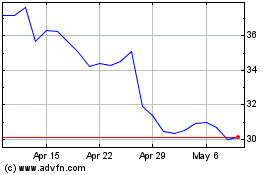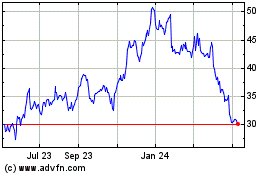Intel Deepens AI Push With $2 Billion Purchase of Habana Labs -- 2nd Update
December 16 2019 - 5:25PM
Dow Jones News
By Asa Fitch and Michael Dabaie
Intel Corp. is expanding its push into the
artificial-intelligence market with an approximately $2 billion
deal for Habana Labs, an Israel-based AI chip-making startup.
Intel said the deal strengthens its lineup of
artificial-intelligence chips for use in data centers. Those are
the large information-storage facilities where companies
increasingly are running AI algorithms to analyze data to, for
instance, identify customer trends that otherwise might be too hard
to spot.
Even before announcing the Habana purchase, the chip-making
giant said it expected to generate more than $3.5 billion in
AI-related sales this year, up around 20% from last year.
Intel in recent years has been shopping for several new growth
opportunities as it deals with challenges in some of its core
markets, including powering personnel computers. It acquired
Israeli automotive-camera maker Mobileye NV in 2017 for $15.3
billion in a bet on self-driving car technology.
The Habana deal isn't Intel's first acquisition to bolster its
lineup of artificial- intelligence products. It bought startup
Nervana Systems Inc. in 2016 for around $400 million. It followed
that transaction with the purchase of Movidius, an Irish startup in
another bet on AI growth.
Its Nervana unit in November unveiled its first production
chips. Facebook Inc., which has invested heavily in AI, at the time
said it would use the Intel hardware.
Habana fits into Intel's broader strategy of going after large
new computing markets instead of simply maintaining its dominant
share of the market for computers' main processing chips, Navin
Shenoy, the general manager of the Intel division focused on data
centers and AI, said in an interview.
"We have a relatively small share in a large, growing market, so
our intent is to go after that," he said.
Intel said it expects the market for chips to power AI to grow
to $25 billion by 2024. Almost half that revenue, it said, would be
generated from selling chips to be used in big data centers. Intel
Chief Executive Bob Swan has made AI one of the company's
investment priorities.
Artificial intelligence is one of the hottest areas in
technology. It is underpinning voice assistants such as Amazon.com
Inc.'s Alexa, a key feature in the development of self-driving
cars, and helping companies such as Google and Facebook in
targeting advertising.
That, in turn, has driven the creation, in recent years, of
Habana and dozens of other AI chip startups to help power those
processes. Venture capitalists that largely shied away from chip
investments because of the high development costs have jumped in
given the sector's promise.
Interest in AI has driven acquisitions across the tech industry
landscape. Apple Inc. has made a series of acquisitions, mostly of
startups for undisclosed amounts, of companies specializing in
areas such as facial recognition, AI for home security and
self-driving cars. Alphabet Inc.'s Google has similarly been on an
AI acquisition spree, acquiring an AI-focused customer-service
company, a computer vision company and the prominent British AI
firm DeepMind, among other deals.
Other tech companies have taken notice of AI's potential to
reshape how people interact with electronics and do business.
Deep learning, a powerful form of artificial intelligence that
is in growing use, can require large amounts of computing
horsepower to sift through masses of data to spot trends. Intel has
been playing catch-up to rival Nvidia Corp., whose graphic chips
were better than Intel's standard processors at handling the
calculations needed in AI.
Intel said Habana will remain an independent business unit and
will continue to be led by its current management team and be based
in Israel. Habana will report to Intel's Data Platforms Group, home
to Intel's portfolio of data center class AI technologies.
Habana Chairman Avigdor Willenz will be senior adviser to the
business unit and to Intel.
Capitalizing on its Habana investment may take time. Habana's
annual sales are likely small and unlikely to meaningfully add to
Intel's topline in the near-term, Mitch Steves, an analyst at
Canada's RBC Capital Markets, said in a note.
The transaction also leaves Intel with seeming overlap in its AI
chips between Habana's products and the hardware Nervana produces.
"There are going to be some places where we're going to have to
evaluate what is the best technology going forward," Intel's Mr.
Shenoy said.
Before the deal, Intel Capital was an investor in Habana. Habana
said in November it secured $75 million in an oversubscribed
funding round.
The Habana purchase also gives Intel another type of chip to
sell to lure data-center customers to its range of products. That
could help Intel fend off strengthening competition from rival
Advanced Micro Devices Inc., which this year started producing
chips for data centers that top Intel's by many performance
metrics.
Write to Asa Fitch at asa.fitch@wsj.com
(END) Dow Jones Newswires
December 16, 2019 17:10 ET (22:10 GMT)
Copyright (c) 2019 Dow Jones & Company, Inc.
Intel (NASDAQ:INTC)
Historical Stock Chart
From Mar 2024 to Apr 2024

Intel (NASDAQ:INTC)
Historical Stock Chart
From Apr 2023 to Apr 2024
